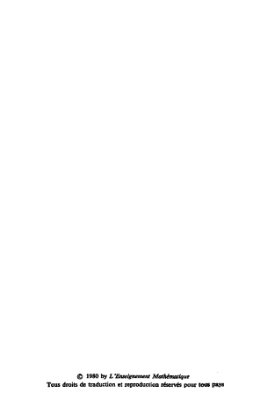L'Enseignement Mathematique. University de Geneve, 1980, -128
pp.
In the present work we will discuss various problems in elementary number theory, most of which have a combinatorial flavor. In general, we will avoid classical problems, just mentioning references for the interested reader. We will almost never give proofs but on the other hand we will try to give as exact references as we can. We will restrict ourselves mostly to problems on which we worked for two reasons: (i) In order not to make the paper too long; (ii) We may know more about them than the reader.
Both the difficulty and importance of the problems discussed are very variable — some are only exercises while others are very difficult or even hopeless and may have important consequences or their eventual solution may lead to important advances and the discovery of new methods. Some of the problems we think are difficult may tu out to be trivial after ail — this has certainly happened before in the history of the world with anyone who tried to predict the future. Here is an amusing case. Hilbert lectured in the early 1920's on problems in mathematics and said something like this — probably all of us will see the proof of the Riemann hypothesis, some of us (but probably not I) will see the proof of Fermat's last theorem, but none of us will see the proof that 2sqrt(2) is transcendental. In the audience was Siegel, whose deep research contributed decisively to the proof by Kusmin a few years later of the transcendence of 2sqrt(2) . In fact shortly thereafter Gelfond and a few weeks later Schneider independently proved that ?? is transcendental if ? and ? are algebraic, ? is irrational and ??0,
1. Thus, we hope the reader will forgive us if some (not many, we hope) of the problems tu out to be disappointingly simple.
Before starting, we mention a number of papers which also deal mainly with unsolved problems in combinatorial number theory. These references, which will not be included in the references at the end of the paper, will have an asterisk appended to them, for ease of later location.
Introduction.
An der Waerden's Theorem and Related Topics.
Covering Congruences.
Unit Fractions.
Bases and Related Topics.
Completeness of Sequences and Related Topics.
Rationality and Transcendence.
Diophantine Problems.
Miscellaneous Problems.
Remarks on an Earlier Paper.
Added in proof.
In the present work we will discuss various problems in elementary number theory, most of which have a combinatorial flavor. In general, we will avoid classical problems, just mentioning references for the interested reader. We will almost never give proofs but on the other hand we will try to give as exact references as we can. We will restrict ourselves mostly to problems on which we worked for two reasons: (i) In order not to make the paper too long; (ii) We may know more about them than the reader.
Both the difficulty and importance of the problems discussed are very variable — some are only exercises while others are very difficult or even hopeless and may have important consequences or their eventual solution may lead to important advances and the discovery of new methods. Some of the problems we think are difficult may tu out to be trivial after ail — this has certainly happened before in the history of the world with anyone who tried to predict the future. Here is an amusing case. Hilbert lectured in the early 1920's on problems in mathematics and said something like this — probably all of us will see the proof of the Riemann hypothesis, some of us (but probably not I) will see the proof of Fermat's last theorem, but none of us will see the proof that 2sqrt(2) is transcendental. In the audience was Siegel, whose deep research contributed decisively to the proof by Kusmin a few years later of the transcendence of 2sqrt(2) . In fact shortly thereafter Gelfond and a few weeks later Schneider independently proved that ?? is transcendental if ? and ? are algebraic, ? is irrational and ??0,
1. Thus, we hope the reader will forgive us if some (not many, we hope) of the problems tu out to be disappointingly simple.
Before starting, we mention a number of papers which also deal mainly with unsolved problems in combinatorial number theory. These references, which will not be included in the references at the end of the paper, will have an asterisk appended to them, for ease of later location.
Introduction.
An der Waerden's Theorem and Related Topics.
Covering Congruences.
Unit Fractions.
Bases and Related Topics.
Completeness of Sequences and Related Topics.
Rationality and Transcendence.
Diophantine Problems.
Miscellaneous Problems.
Remarks on an Earlier Paper.
Added in proof.

